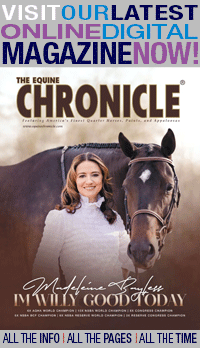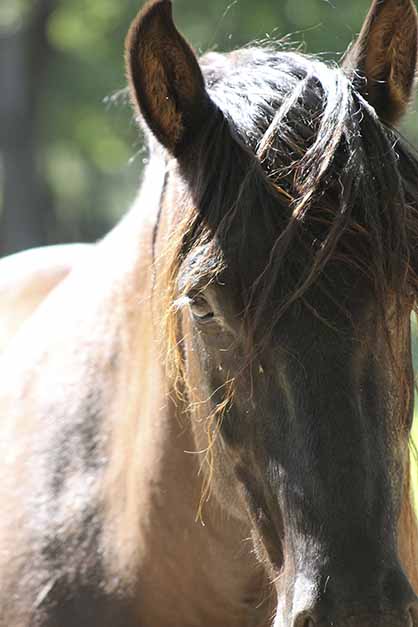The Monthly Equine Wellness Calendar Every Horse Owner Needs
by Zoetis
A perfect addition for your tack room wall.
Every horse deserves quality care and welfare. As an educational leader in the equine industry, Zoetis provides best-in-class equine wellness solutions, ranging from vaccines and dewormers, to pain and sedation products. Help ensure your horse’s health by working with the best resource – your veterinarian – and know his health and wellness needs, outlined in this 12-month calendar.
January
- Schedule spring examination.
Call your veterinarian to schedule your horse’s spring wellness exam and vaccination appointment. The threat of deadly equine diseases like West Nile and rabies is closer than you think. Don’t leave your horse exposed!
- Understand changing senior horse health.
Do you have a horse older than 15 years old? One significant change in senior horses is their immune system, as they can become more susceptible to disease because of their immune system’s inability to work as well as it did earlier in life. Prioritize vaccinations to help prevent disease and, to help him properly process feed and prevent colic risks, schedule routine dental care.
February
- Evaluate your horse’s diet.
Is your horse receiving the nutrition he needs to sustain weight through the winter months? Snow, freezing rain and below-freezing temperatures increase a horse’s energy requirements, especially if he’s kept in a pasture or outdoor paddock. Maintaining core body temperature can often result in weight loss over winter.
March
- Prioritize horse health.
It’s time for your horse’s spring wellness exam and vaccination appointment. Help ensure your horse’s safety through annual vaccinations against the five core equine diseases: Eastern and Western equine encephalomyelitis, rabies, tetanus and West Nile. Based on your horse’s lifestyle, discuss with your veterinarian whether he needs additional risk-based vaccinations, such as equine influenza, equine herpesvirus, leptospirosis or strangles. For the most comprehensive protection available, all products in the Innovator™ line of vaccines from Zoetis are covered under the Equine Immunization Support Guarantee.
- Prepare for travel – Coggins tests, health certificates and first aid kit. If you plan to travel with your horse in the coming months, check your files to see whether it’s time for an updated Coggins test or health certificate.
April
- Schedule your horse’s annual dental examination.
Horses require an annual dental examination, at a minimum, to help maintain a healthy weight and perform at their best. - Request a fecal egg count (FEC) exam.
Ask your veterinarian about conducting an FEC exam for a quantitative assessment of your horse’s parasite burden to identify the frequency of treatment needed.
May
- Deworm your horse in spring.
Parasite levels can be at their highest during the spring and fall, and spring is the ideal time to treat for encysted small strongyles (strongyles in the larval stage). Quest® Gel from Zoetis is a broad-spectrum anthelmintic that, with just a single dose, effectively treats and controls encysted small strongyles, bots and roundworms.
June
- Follow biosecurity best practices. In the heat of competition and trail-riding season, make sure you are following biosecurity best practices to help keep your horse healthy while traveling. Bring your own equipment, including buckets, and do not retrieve water from a communal source. Also limit exposure to other horses, especially direct nose-to-nose contact, as strangles and equine herpesvirus can be passed on to your horse from passive carriers. Use caution in communal areas, like grazing areas, as bacterial infections and parasites can live outside of the host.
- Help prevent injury.
Fireworks displays can cause not only great disruption to lives of horses but also grave danger and injury due to fireworks-related anxiety. Maintain your horse’s health and safety and, before celebrating July Fourth, ask your veterinarian about prescribing Dormosedan® Gel (detomidine hydrochloride), which provides mild sedation lasting up to three hours.
August
- Know signs of heat stress.
Without taking proper steps, heat stress can be a dangerous reality for your horse. Familiarize yourself with the signs of heat stress, which include weakness, stumbling, and increased respiration and temperature. Help ensure your horse’s safety by providing all-day access to fresh water, free choice salt or mineral blocks, and properly ventilated barns.
September
- Prepare for winter.
Winter is soon approaching: make sure your barn and the horses stabled within it are prepared. Do you have a plan for snow removal or have hoof-friendly salt to help prevent injury in the paddocks? Is the roof able to handle extra weight from snow and precipitation? Make sure your horse is comfy-grey-sweater ready for the winter season.
October
- Administer booster vaccinations.
Now is a good time to administer booster vaccinations to help protect your horse’s health. While annual spring vaccinations help offer disease protection and can activate an immune response, the American Association of Equine Practitioners (AAEP) vaccination guidelines recommend at-risk horses be vaccinated for equine influenza and equine herpesvirus, also called rhinopneumonitis, every six months.1 Fluvac Innovator® vaccines are the most trusted equine influenza vaccines and help provide your horse with broad protection against newly emerging and conventional equine influenza virus strains as well as equine herpesvirus (EHV-1 and EHV-4).2
November
- Deworm your horse in fall.
The AAEP recommends tapeworm treatment once a year, in the late fall or early winter.3 Quest® Plus Gel is the ideal deworming choice for late fall as it treats and controls bots, encysted small strongyles and roundworms in a single dose. Quest Plus also contains an additional active ingredient – praziquantel – that specifically targets tapeworms. Horses may harbor tapeworm infections without showing signs of discomfort; however, the parasite can cause colic — from mild to severe colic episodes requiring surgical treatment.4
December
- Keep close watch on blankets.
As winter is in full swing, keep a close watch on your horse’s blankets for both fit and condition. Ensure his blanket is snug and does not slide off to one side, which can cause injury.
Work with the veterinarian on your team to ensure your horse’s health and wellness year-round. For additional information and resources, please visit zoetisUS.com.
IMPORTANT SAFETY INFORMATION
Do not use Dormosedan Gel in horses with pre-existing atrioventricular (AV) or sinoatrial (SA) block, with severe coronary insufficiency, cerebrovascular disease, respiratory disease, or chronic renal failure. Do not use in anesthetized or sedated horses, or in conditions of shock, severe debilitation or stress due to extreme heat, cold, fatigue or high altitude. Do not use in horses intended for human consumption. Handle gel-dosing syringes with caution to avoid direct exposure to skin, eyes or mouth. See full Prescribing Information.
Do not use Quest Gel or Quest Plus Gel in foals less than 6 months of age or in sick, debilitated and underweight horses. Do not use in other animal species, as severe adverse reactions, including fatalities in dogs, may result.
About Zoetis
Zoetis is the leading animal health company, dedicated to supporting its customers and their businesses. Building on more than 60 years of experience in animal health, Zoetis discovers, develops, manufactures and markets veterinary vaccines and medicines, complemented by diagnostic products, genetic tests, biodevices and a range of services. Zoetis serves veterinarians, livestock producers and people who raise and care for farm and companion animals with sales of its products in more than 100 countries. In 2016, the company generated annual revenue of $4.9 billion with approximately 9,000 employees. For more information, visit www.zoetisUS.com.
1 The American Association of Equine Practitioners. Risk-Based Vaccination Guidelines. Equine Influenza. https://aaep.org/guidelines/vaccination-guidelines/risk-based-vaccination-guidelines/equine-influenza. Accessed October 30, 2017.
2 Data on file, MDI sales data for FLUVAC INNOVATOR® as of 12/31/16, Zoetis Inc.
3 American Association of Equine Practitioners. AAEP Parasite Control Guidelines https://aaep.org/guidelines/parasite-control-guidelines. Accessed October 30, 2017.
4 American Association of Equine Practitioners. Internal Parasites: Strategies for Effective Parasite Control https://aaep.org/horsehealth/internal-parasites-strategies-effective-parasite-control. Accessed October 30, 2017.
All trademarks are the property of Zoetis Services LLC or a related company or a licensor unless otherwise noted. Dormosedan is a registered trademark of Orion Corporation, distributed by Zoetis Services LLC.
© 2017 Zoetis Services LLC. All rights reserved. GEQ-00359












